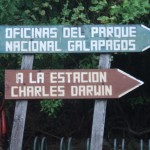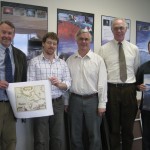 Source: Charles Darwin Foundation Press Release.
Source: Charles Darwin Foundation Press Release.
Dr. Francisca Massardo, coordinator of the Universidad de Magallanes in Puerto Williams, was recently invited to participate in an international workshop on “Island Cultures and Sustainable Lifestyles,” hosted from 28-30 September at the Charles Darwin Biological Station, Galapagos Islands, Ecuador.
The event brought together international experts from islands of the South Pacific, New Zealand, Easter Island, Fiji, the Orkneys and Galápagos, and Chile, who together with members of local and national institutions, NGOs, and invited guests, exchanged experiences on the themes of island societies and environments.
To inaugurate the workshop, CDF Executive Director Dr. J. Gabriel López underlined the importance of this event: “This is the second in our series of workshops on Island Sustainability. Rather than identify only problems, CDF and our partners are focused on devising sustainable solutions and we wish to draw on experiences from throughout the world that can be applied to Galápagos. This is part of a fresh approach to broadening the conservation agenda by involving Galápagos communities and other stakeholders in an integrated effort to design an archipelago-wide sustainable development model that can serve as a guide for decision making and as an example for the world.”
Felipe Cruz, CDF Director of Technical Assistance, stated that: “The workshop will deepen understanding of the different realities lived in various archipelagos on Earth, but above all, here in Galápagos because of their international fame and unique biodiversity that bring nature and people together.”
Among the principal themes for discussion were:
1. Local production vs. imported goods and services;
2. Consumption patterns and daily life;
3. Human mobility.
This is CDF’s second international “Island Sustainability” workshop among a series programmed for 2010-2011 covering topics such as tourism, energy and transport, water and waste management, and climate change, among others, all linked to island conservation and sustainable development.
Monthly Archives: September 2010
UMAG and the University of Alaska – Fairbanks Sign Cooperative Agreements
 Between 5 and 20 September, representatives from the Universidad de Magallanes carried out an series of trips to the University of Alaska – Fairbanks (USA) and Tromso University (Norway). The delegation was headed by Dr. Andrés Mansilla, Director of Research and Graduate Programs at UMAG together with Dr. Christopher Anderson, Coordinator of the Sub-Antarctic Biocultural Conservation Program and Dr. Silvia Murcia, academic of the Master’s of Science in Management and Conservation of Sub-Antarctic Ecosystems.
Between 5 and 20 September, representatives from the Universidad de Magallanes carried out an series of trips to the University of Alaska – Fairbanks (USA) and Tromso University (Norway). The delegation was headed by Dr. Andrés Mansilla, Director of Research and Graduate Programs at UMAG together with Dr. Christopher Anderson, Coordinator of the Sub-Antarctic Biocultural Conservation Program and Dr. Silvia Murcia, academic of the Master’s of Science in Management and Conservation of Sub-Antarctic Ecosystems.
The academic tour was the result of recommendations from the Chilean National Accreditation Commission, which suggested to UMAG to strengthen its links with other universities in similarly high latitudes, which provides meaningful comparisons and exchanges for research and collaborative projects.
With funding from the Ministry of Education, the Office of Research and Graduate Programs and the Sub-Antarctic Biocultural Conservation Program, these delegates visited Fairbanks, Alaska; Denton, Texas; and Tromso, Norway to meet with authorities and professors in areas such as Environmental Science, Engineering, Mining, Tourism, Renewable Energy, Conservation, Health, Oceanography & Fisheries and Agriculture, as these topics relate to high latitudes.
This visit resulted in the definition of various projects and the signing of 4 Memoranda of Understanding (MOUs) and the renewal of the existing MOUs with the University of North Texas. According to Dr. Mansilla “this tour was really marvellous. In each place, the UMAG was recognized by our peers as an international collaborator of great relevance, especially for the studies of topics such as global change. At the same time, the experience of Alaska and Norway in areas related to mining, sustainability, renewable energies, etc. is very important for us in Magallanes.”
Photo: Drs. Anderson and Mansilla meet with directors of the International Arctic Research Institute, the Polar Biology Institute and the Office of Research at the University of Alaska – Fairbanks.
